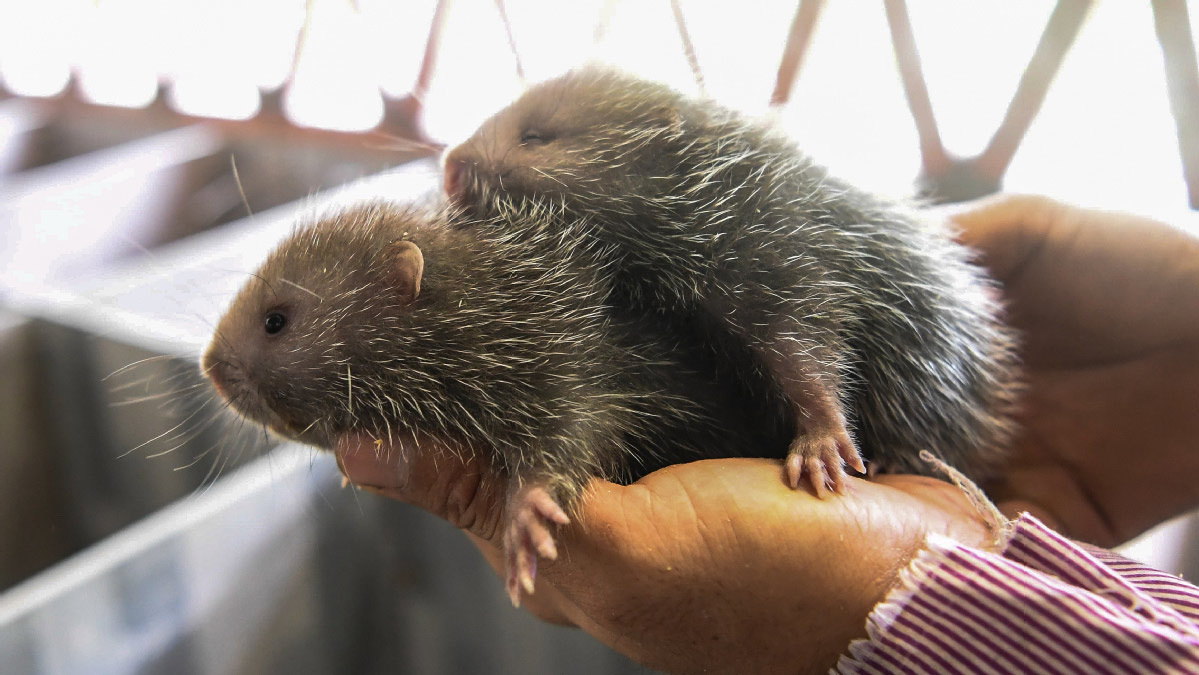


Farmer Lin Jinghong nurses a bamboo rat in Qinzhou city, South China's Guangxi Zhuang autonomous region, on July 24, 2019. (Photo/Xinhua)
Tighter rules will help reduce risk of serious diseases jumping to humans
Trading of animals will be put under greater scrutiny for epidemic prevention and control and public health, according to a revised law adopted by China's top legislature on Friday.
Related departments such as health, rural affairs and wildlife protection at county level or above should establish cooperative mechanisms for the prevention and control of diseases that jump from animals to humans, according to the Animal Epidemic Prevention Law.
In case of such an outbreak, health authorities should take corresponding measures for prevention and control, according to the law.
The Ministry of Agriculture and Rural Affairs should formulate a list of such diseases together with related departments such as the National Health Commission and release the list, the law said.
Inspection of wild animals will also be strengthened to prevent outbreaks, the law said. Utilizing wild animals for purposes other than meat, such as scientific research, drug development and exhibition, will also be subject to strict approval procedures, inspection and quarantine measures.
All markets engaged in the trading of animals and animal products should meet conditions for epidemic prevention and follow supervision and inspection by agricultural and rural affairs authorities.
The law also mandates governments at county level or above ban live trading of livestock and poultry in certain areas in their jurisdictions if necessary.
The law was revised amid the global COVID-19 pandemic, caused by the novel coronavirus, which is generally believed to have been transmitted to humans from animals, although the host animals have not been identified despite efforts from scientists from across the world.
The revised law takes effect on May 1 this year.
The law was adopted following three revisions by the Standing Committee of the National People's Congress, China's top legislature. The first draft of the revision was submitted to the body for deliberation in April last year.
Wang Guanfang, a legal official from the NPC's Agriculture and Rural Affairs Committee, said the existing Animal Epidemic Prevention Law was implemented in 2008, and animal epidemic risks have increased in recent years due to reasons such as more frequent international exchanges of personnel and goods, which required a revised law.
"Animal diseases are closely related to human infectious diseases, as 70 percent of animal diseases can be transmitted to humans, and 75 percent of new infectious diseases targeting humans originate with animals," she said.
"Putting animal diseases under control will significantly improve public health."
Wang Gongmin, deputy head for veterinary and animal husbandry at the Ministry of Agriculture and Rural Affairs, said the law stipulates measures to ensure effective operation of animal epidemic control and prevention forces at the grassroots level, including ensuring financial investment for animal epidemic prevention and control, and paying compensation for animals and related goods destroyed for disease prevention and control.
Measures will also be implemented to encourage the private sector to participate in animal epidemic prevention and control, he said.
China is the world's biggest producer of meat and poultry, but most meat and poultry producers are households and small companies, making effective supervision more difficult. Establishing a highly competent force is a crucial task for animal epidemic control and prevention, he said.

 Award-winning photos show poverty reduction achievements in NE China's Jilin province
Award-winning photos show poverty reduction achievements in NE China's Jilin province People dance to greet advent of New Year in Ameiqituo Town, Guizhou
People dance to greet advent of New Year in Ameiqituo Town, Guizhou Fire brigade in Shanghai holds group wedding
Fire brigade in Shanghai holds group wedding Tourists enjoy ice sculptures in Datan Town, north China
Tourists enjoy ice sculptures in Datan Town, north China Sunset scenery of Dayan Pagoda in Xi'an
Sunset scenery of Dayan Pagoda in Xi'an Tourists have fun at scenic spot in Nanlong Town, NW China
Tourists have fun at scenic spot in Nanlong Town, NW China Harbin attracts tourists by making best use of ice in winter
Harbin attracts tourists by making best use of ice in winter In pics: FIS Alpine Ski Women's World Cup Slalom
In pics: FIS Alpine Ski Women's World Cup Slalom Black-necked cranes rest at reservoir in Lhunzhub County, Lhasa
Black-necked cranes rest at reservoir in Lhunzhub County, Lhasa China's FAST telescope will be available to foreign scientists in April
China's FAST telescope will be available to foreign scientists in April